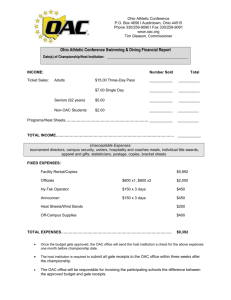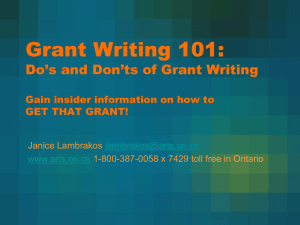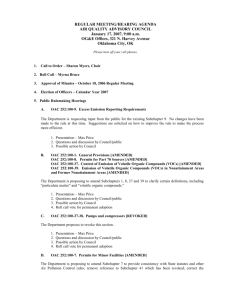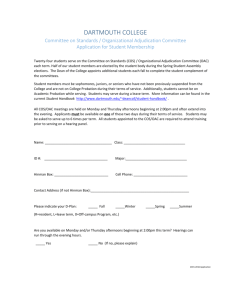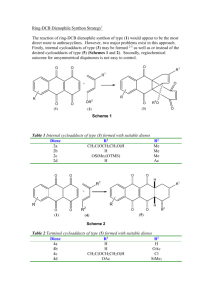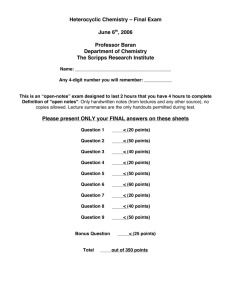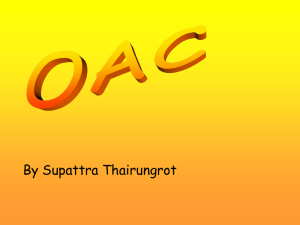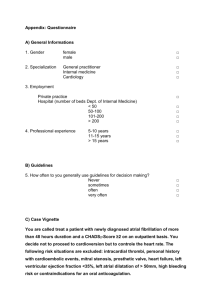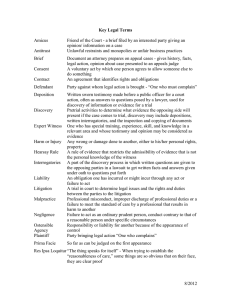GrenAdminDiscoverypresentation
advertisement
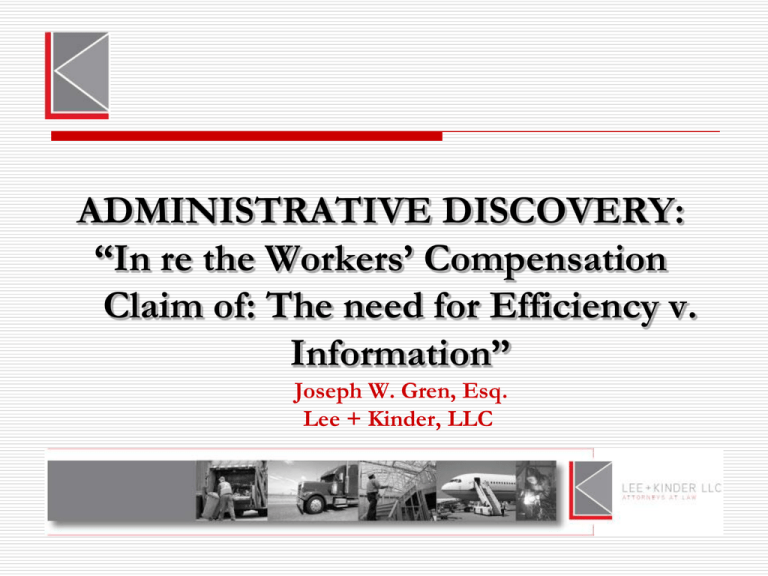
ADMINISTRATIVE DISCOVERY: “In re the Workers’ Compensation Claim of: The need for Efficiency v. Information” Joseph W. Gren, Esq. Lee + Kinder, LLC Content OAC Overview General Services v. Work Comp Modes and Methods of Discovery Respondent Discovery Concerns Claimant Discovery Concerns OAC /DOWC Discovery Concerns Sanctions Office of Administrative Courts Organic Act, Section 24-30-1001(1), C.R.S. Primary adjudicatory body for disputes arising within 50 Colorado govnt. administrative agencies Public Benefits (Medicaid, Food stamps) Non-Public Benefits Workers’ Compensation Benefits Office of Administrative Courts Purpose: “The Office was created to provide an accessible, independent, and cost-effective process to hear and resolve disputes related to government agencies’ statutes, rules, and regulations, including those that govern eligibility determinations for public benefits.” OAC W.C. Performance Audit, 2012 (p.13) http://www.leg.state.co.us/OSA/coauditor1.nsf/All/0DB430186D34878087257A9 40051CB3C/$FILE/2176%20OfficeAdminCourts%20Perf%20Sept%202012.pdf Workers’ Compensation – 59% of OAC case load 1800 hearings including disfigurement The trend was 19% reduction in hearings and OAC resolution over 4 years from 2008-2012. Why the reduction in hearing at OAC? Broader discovery? More settlements because of available information? But audit assesses performance on meeting statutory timeframes for conducting hearings Concluded that OAC did not “consistently hold” hearings according to guidelines Next Audit in 2016. Office of Administrative Courts Authority to Permit Discovery in Proceedings 4 Sources for Discovery Rules Colorado Rules of Civil Procedure Organic Act of each Agency or Benefit OAC Procedural Rules Rules promulgated by each agency administering the entitlement benefit Office of Administrative Courts Rules of procedure and discovery overlaid by C.R.C.P. 81(a) “These rules do not govern and practice in any special statutory proceeding insofar as they are inconsistent or in conflict with procedure and practice provided by applicable statute.” Limitation set by respective Statute W.C.: Limitations set by administrative rule promulgated consistent with Statute? OAC – General Services General Services’ Procedural Rules Rule 9: Applies to 90 Day Docket GS proceedings “To the extent practicable” C.R.C.P. 26-37 governs discovery Except when the rules provide for required disclosures or when discovery can be initiated No ALJ permission required OAC – General Services Rule 9-B: CRCP 16 not applicable Rule 9-C: Permits requests for admissions Rule 9-D: ALJ not involved unless resolving dispute [no permission for pro se discovery] Rule 9-E: Permits modification of discovery deadlines and limitations Rule 13-B: ALJ can modify discovery by PHC Rule 13-A(2): new witnesses and exhibits can be added 20 days before hearing if not reasonably foreseeable at the time of mandated prehearing statements due. OAC – Workers’ Compensation Special Statutory Proceeding 8-43-201(1), C.R.S. Director of DOWC and OAC has statutory jurisdiction to hear and decide all matters arising under W.C. Act OACRP Rule 2: C.R.C.P. apply to W.C. hearings unless they are inconsistent with “these rules” and “provisions of the Workers’ Compensation Act.” OAC Rules do not Address Discovery OAC – Workers’ Compensation What in Act governs discovery? Section 8-43-207(1)(e): “Upon written motion and for good cause shown, [the ALJ are empowered to] permit parties to engage in discovery; except that permission need not be sought if each party is represented by an attorney.” Director or ALJ may rule on discovery matter and impose sanctions provided in C.R.C.P. for willful failure to comply with permitted discovery. Act presumes discovery is permitted. Nothing in Act expressly limits discovery permitted by rules of civil procedure in OAC proceedings OAC – Workers’ Compensation Division of Workers’ Compensation Rule 9-1 outlines discovery. Does Division rule apply in OAC? Section 8-43-207.5(1),(2) permits Prehearing Judges in Division to resolve “discovery matters” and authority for “parties to cause depositions” Section 8-43-207.5(4): “Director shall adopt rules and regulations as may be necessary to implement…this section.” DOWC Discovery Rules Rule 9-1 limits discovery. “One of the goals of the workers’ compensation system is to minimize litigation, but disputes do arise and a system for resolution is necessary. One of the underlying premises of an administrative adjudication system is that parties should be able to resolve disputes in, as much as possible, a quick, inexpensive and simple manner. Therefore, when discovery is authorized and appropriate, the following apply:” DOWC – Discovery Rules (Modes and Methods) Specific to an application for hearing. Anderson v. Anderson Distributing, W.C. No. 4-722-115 (August 5, 2008). When Application is withdrawn, then discovery ends and no continuing obligation to update propounded discovery. Reji v. Pitney Bowes, Inc., W.C. No. W.C. No. 4806-086(July 11, 2011). Prehearing discovery may be warranted All discovery must be completed 20 days prior to hearing except for exp. hearing. Modes and Methods Interrogatories (Rule 9-1(A)(1-3)) one set of not more than 20 interrogatories and production of documents Each question or POD is a single question or request. Responses due 20 days from date of mailing of the interrogatories. Cut off to send discovery is 40 days prior to hearing except for expedited hearing. Modes and Methods Depositions: Not permitted as a matter of right The rules provide for depositions of parties and non-party witnesses. Can be evidentiary or for discovery purposes Can be done prehearing or post-hearing when good cause is shown for testimony by deposition, section 8-43-210, C.R.S. Modes and Methods Deposition of a party; Rule 9-1(B)(1): Requires motion and order. Permission will be granted only when there is a specific showing: (a) That a party who has been served with written interrogatories has failed to respond to the interrogatories; or (b) That the responses to the written set of interrogatories are insufficient; or (c) All parties agree to the taking of a deposition. Modes and Methods Deposition of non-party witnesses Rule 9-1(B)(2): Depositions of other witnesses may be taken upon written motion, order, and written notice to all parties. Modes and Methods (Misc.) 9-1(E) Imposition of sanctions upon such party pursuant to statute and rule. However, attorney fees may be imposed only for violation of a discovery order. 9-1(F) Asserted privileges shall be accompanied by a privilege log with sufficient description to allow the other parties to assess the applicability of the privilege claims. 9-1(G) Once an order to compel has been issued and properly served upon the parties, failure to comply with the order to compel shall be presumed willful. 9-1(H) Upon agreement of the parties or for good cause shown, an administrative law judge may allow additional discovery, may limit discovery or may modify the time limits set forth in this rule. Setting of a formal hearing on an expedited schedule shall constitute good cause. Good cause shall include but not be limited to an agreement of the parties . Modes and Methods (Misc.) Need an order to expand discovery Use of interrogatories beyond 20 questions Preservation of discovery obligations when multiple applications for hearing filed on similar or the same issues Request for admissions Site evaluations (may be?) Non-Discovery Disclosures W.C.R.P. 5-4(C) Releases/Information Medical information from health care providers who have treated the part(s) of the body or conditions(s) alleged by the claimant to be related to the claim, during the period five years before the date of injury and thereafter through the date of the request, will generally be considered reasonable. Burden on Respondents to show that it is reasonably necessary to adjust claim to expand 5 year period Informal disclosures are not considered to be discovery (attorney fee sanction does not attach). Mandatory Claim File Disclosure under section 8-43-203(4), C.R.S. Respondent Concerns Access to claimant’s medical history beyond 5 year period and for other conditions Access to claimant’s private financial information Access to Social Security information Protecting Proprietary Information Protecting Insurance Information Claimant Concerns Access to Employer’s information on other employees’ injuries Access to / preservation of Expert records Obtaining verification of answers Protecting Claimant from disclosing embarrassing medical conditions DOWC/OAC Concerns Protecting / advising pro se claimant’s on discovery matters Expediting hearings v. diligence of conducting discovery Issuing orders / promulgating rules contrary to privacy laws Discovery Sanctions Discovery Sanctions based upon willful conduct In order for a discovery violation to be considered “willful” the ALJ must determine that the conduct was deliberate or exhibited “either a flagrant disregard of discovery obligations or constitutes a substantial deviation from reasonable care in complying with discovery obligations.” Reed v. Industrial Claim Appeals Office, 13 P.2d 810, 813 (Colo. App. 2000). Types of Sanctions General monetary penalties for willful violation of motion to compel or order of PALJ. Must allege violation of an order to be entitled to monetary penalties. Holliday v. Bestop, Inc., 23 P.3d 700 (Colo. 2001); see Williams v. ADT Security Services, Inc. W.C. No. 4-508-408 (November 17, 2003). Ongoing daily penalty under Crowell for each day party fails to respond? Reasonable attorney fees for violation of discovery order Use of C.RC.P. 37(b) Preclusion of witness testimony Application for Hearing stricken Dismissal of case Preclusion of Testimony ALJ must exercise discretion when assessing sanctions, including testimonial preclusion C.R.C.P. 37; Nova v. Industrial Claim Appeals Office, 754 P.2d 800 (Colo. App. 1988) Factors ALJ may consider when precluding testimony: Whether there was a continuing obligation to supplement Whether the party requests a continuance because the party does not have adequate notice of testimony Whether a party can show prejudice: (1) specify if disclosure would have elicited additional information (2) how absence of disclosure caused a party prejudice (3) whether party had substantial justification not to disclose Whether a motion to compel was requested Whether a party had an opportunity to cross examine the witness No obligation to supplement witness testimony or provide expert testimony when discovery was propounded in connection with past application for hearing. Preclusion of Testimony No obligation to produce information, including market surveys and information gained through contact with employers if: (1) the information is not reduced to writing; and (2) the requesting party propounds a POD rather interrogatory asking for detailed summary of expert testimony. Hoffman v. United Airlines, W.C. No. 4-991-882 (September 23, 2002); see also Oversole v. JDK Enterprises, W.C. No. 4-351-273 (July 13, 1999). Dismissal Dismissal Without Prejudice PALJ may strike application for hearing of a party for failure to comply with interlocutory discovery orders. Section 8-43-207.5(2), C.R.S. Dismissal With prejudice OAC ALJ can dismiss claims with prejudice for willful discovery violations ALJ has discretion to dismiss claim under C.R.C.P. 37(b)(2)(C) as the most “severe” form of sanction Dismissal by motion must be supported by evidence Gonzales v. University of Colorado Health, W.C. Nos. 4-865-972 & 4-851-350 (June 12, 2014)
